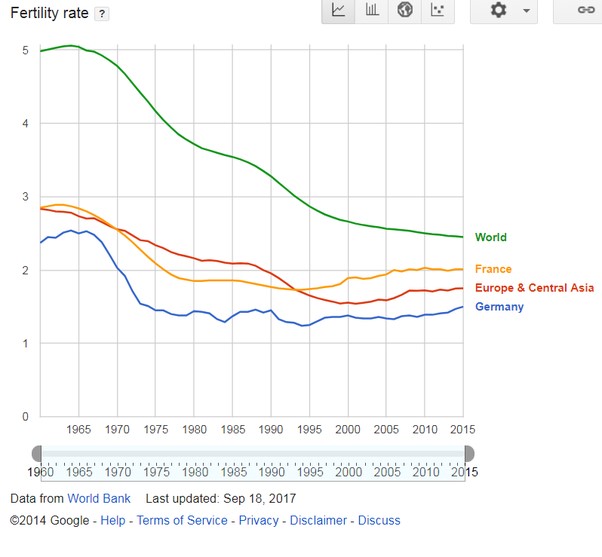The playgrounds are only a little emptier than usual as Italy’s coronavirus locked down the entire country. But with 1.316 births per woman, the current fertility rate in 2020 is far below replacement levels of 2.1 per mother. Combined with a longer life expectancy, the ageing population increases the dependency ratio and strains the pension system sustainability as claimants exceed contributors. This is expected to jump from 34% in 2015 to >60% by 2070. While education and social emancipation are the most potent birth control tool in human populations, the post-industrial story of falling birth rates and zero population growth has failed to materialise. The “pioneers” Japan and Italy have shown not to be the norm, but rather the exception. Their low immigration, high life expectancy, low fertility rates and negative population growth are not the story for the gender equal, highly developed European nations…
Animal Kingdom
Humans are the only species where birth rates respond negatively to better nutrition and shelter. With increasing prosperity and life security, humans perceive lower threat to survival and stem breeding. Even India’s middle class has shifted to having 2 children per mother as the norm.
Save the middle class
The truly wealthy can afford lots of kids. Those on benefits don’t bear the cost. The middle class can’t afford them. They pay for the welfare for the poor, and the tax cuts for the rich. Housing, good schools, school programmes, day care, tuition, health care etc.
For today’s young adults, maintaining lifestyles of the Baby Boomers while raising children on significantly lower real incomes is not feasible. We are the generations complaining about the lack of time to do the things we want, who has time to raise children anyway?
Women’s Choice
Taken in isolation, when more choices are given to women, many choose to have fewer children or simply none. Many go through education, pursue a career and in doing so have higher standards for choosing their soulmates. Some find theirs, others do not. Whereas, developing countries have young girls married off without consideration of their own life prospects.
Feminist movements modernised developed societies, changing women’s roles from simple child bearer with womb up for auction into productive individuals able to cast their own dice.
Technological change has relieved women in developed nations from the hassle of chores. The washing machine liberated women of “washing days” just as cleaning companies have allowed for division of labour so women could turn their attentions to their most productive pursuits, leaving time to pursue their interests or leisure.
These are reasons for birth rates tending to drop as country’s develop. But the modern phenomenon of falling fertility rates is the rising cost of living. Gross incomes haven’t kept pace with the positive inflation targets for “healthy economies”, causing real wages to fall and resulting in lower purchasing power. As young adults struggle to make ends meet, the incentives to have a child who needs additional financial support are diminished.
Income Inequality within developed nations
Middle classes have been shrinking a while now. Either falling into poverty or never materialising in the first place, the lack of property-owning couples holding down jobs able to support a family is being squeezed. With greater onus on leisure and changing social patterns, the redress needs to be much wider and far reaching.
Though, fertility can increase under more gender equality, not decrease. Kohler and Billari found in 2011 that once a suitable level of gender equality is reached, this serves as a precondition for the increasing fertility in more advanced levels of development. They found this was specific to how countries address the problem of combining work and family. Failure to address the challenges of development with institutions that facilitate work-family balance and gender equality may explain falling fertility rates in otherwise advanced nations.
Bad demographics
Explanations attributing fertility decline in developing nations like Brazil, with fertility falling from 6+ to <2 over the past 50 years, to more urbanised, wealthier living and Brazilian soap operas glorification of small families are over-simplistic.
Likewise, just because a country is rich, does not mean it is good at family planning. Just because women are more empowered than they used to be, does not mean that the work is done. Women have gone to work, and men have not taken up the slack in household chores or bringing up the children, creating a double load. Pew Research found women have more career interruptions, with 58% of working mothers finding it difficult to juggle work-home balance and only 19% of men.
How to redress the balance
The wage gap between men and women cannot be entirely explained away by labour market factors such as part-time versus full-time employment. Wage discrimination takes many forms. With the aim of reducing the expense of raising children, we should strive toward increasing overall household income. This could be achieved by better parental leave policies for men, allowing households to improve family planning and work scheduling. This would balance out the load of parenting, reducing one such hurdle to having children. Supporting day care centres and family planning centres with financing and directives would also help nudge couples to make the step.
Because as we have seen, at a certain level of development, something drastic happens in society. In short, fertility rates in the most developed states started growing again. France, Sweden, UK, Netherlands, Denmark and Norway are nearing sustainable birth rates again.

These societies found a way to make it easier and more attractive for their citizens to have 2–3 children again.
What seems to work well is a combination of:
- Available and affordable childcare and education
- Full day schools for young children
- Societal acceptance for children and parents at the workplace.
- More time for parental leave so work schedule rearranging can increase household income, offsetting some of the stagnation in real wages and high cost of living.


